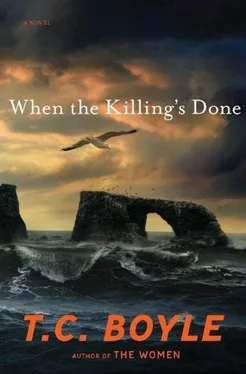She feels a familiar stab of unease, swings round and maneuvers herself to the front of the group, beside Tim. He’s made a platform of a rock the size of an ottoman and he’s standing atop it, arms akimbo, sunglasses dangling from one hand. The frayed baseball cap he hung on the bedpost last night so as not to forget it is pulled down tightly over his brow, leaving the lower half of his face to incandesce in the sun. At the moment, he’s delivering a synopsis of the burrowing owl’s habits and predilections, and the hikers have gathered round him to reflect on the cored-out habitation of the creature itself, which proves to be absent. She clears her throat to get their attention. “Anybody getting hungry?” she asks. “Because I sure am.”
Well, they are. Of course they are. There is an unspoken quid pro quo here. Whenever she leads a group hike for PR purposes, there’s always the promise of a good and bountiful free lunch and the chilled wine to go with it. One of the hikers, a stout woman in an unfortunate straw hat that whips round her face in the wind till it’s like one of those plastic hoods the veterinarians use on dogs — and is she the mayor’s wife or his special friend? — looks particularly ready, so Alma focuses her smile on her. “All right then. Follow me.”
Then she’s leading them down the trail and back to where Wade and his helpers, Alicia among them, have set out the meats, salads and other dishes on a long table made festive with a crisp white cloth and a vase of wildflowers. Beyond the table, in the near distance, the lighthouse stands burnished and welcoming under the sun, the sea fanning out in a dazzle of color beneath it, everything companionable and inviting. Like a party. Exactly like. The hikers break ranks as they approach, what had been single file giving way to drift, people talking in low voices, chugging from water bottles, joking in the spirit of camaraderie a shared experience of nature always seems to bring out. Alma’s eyes flit critically over the scene, not keeping score exactly, but noting who’s elected to stay behind and trying to get a quick take on their various moods and postures — do they look hungry, bored, pleased? That sort of thing. It’s almost a reflex with her.
She spots Toni Walsh standing on the far side of the fire pit, a glass of wine in one hand, cigarette in the other, chatting up Alicia. Alicia? But then Alma can’t control everything and whatever Alicia — dark-eyed, stylish, twenty-something, about as talkative as a stone — can tell Toni Walsh probably won’t amount to much and certainly can’t hurt the cause. Alicia’s a secretary, that’s all, and she’s stolidly efficient, if bloodless, but she’s had no training in restoration ecology except what she’s picked up by osmosis, and Alma doesn’t doubt for a minute it’d be all the same to her if she worked in industry or service or for the polluters themselves.
In fact, she’s remembering a time when she and Alicia were alone in the office, working late on a paper the superintendent was going to deliver before a gathering presided over by the secretary of the interior, Alma reading proof aloud and Alicia checking it against her own copy. It was fairly dull going — Freeman was no Rachel Carson — and at some point they took a break and went out on the deck to watch the fog tangle itself in the shrubs. Alma found herself doing the talking, trivial things mostly, nothing to do with work, and if Alicia didn’t want to open up, even then, when things were more relaxed than during regular working hours and the boss-employee dynamic might have constrained her, Alma could understand that. But to get the girl to say anything, about her boyfriend, her parents, a movie she’d seen — the weather even — was all but impossible. With her it was always yes or no or uh-huh — if she had any opinions, she kept them to herself. And yet on this occasion — just this once — she did speak up, apropos of nothing. Or, as Alma later realized, of a minor point Freeman was making with regard to biological control in closed ecosystems.
“I don’t know why we have to kill everything,” she said, studying her nails, which had been done in two colors, aquamarine and raspberry, and speaking in a voice so soft it was barely audible. No eye contact. Eye contact would be confrontational, assertive, and Alicia, if anything, was non-assertive, more the vessel than the substance that fills it. “What if we just left everything alone like the world was before us — like God made it. Wouldn’t that be easier?”
Alma had been stunned. To think that this girl, this young woman, this locked box of a personality, had been working and breathing and thinking amongst them since she left community college, and she’d absorbed nothing? Zero? Zilch? And maybe she could have responded more gently, more in the tutorial mode, in the way of the educator she ostensibly was, but that was the end of the conversation and of Alicia’s attempt to reach out and engage the issues, because Alma, her voice gone flat, said, “But that’s exactly wrong, don’t you see? Because we’re the ones who put the animals there, the sheep and cattle and pigs on Santa Cruz and Santa Rosa, the rats on Anacapa and cats and rabbits on Santa Barbara, and it’s our obligation, our duty ”—and then she was lecturing, she couldn’t help herself, and Alicia never raised her eyes from the nest of her hands and never said another word that wasn’t yes or no or uh-huh.
At any rate, she reminds herself yet again, this is a party and she should just let go, at least for today. She tries out a smile and a little wave for Toni Walsh and Alicia, clasps hands with half a dozen people and casts a quick glance over the table. Wade — with Alicia’s help — has done his job well, as usual, and everything’s ready to go. Beautifully. Swimmingly. And if there’s a detail that’s escaped her, some niggling thing she feels sure she’s forgotten as if she’s trapped in one of those early-morning dreams where she’s late for class or the airplane or can’t find her blouse or brassiere or jeans, it’ll just have to remain undiscovered. Determined, she lifts an empty glass from the table and wades into the crowd, going from one group to another to encourage them to step up to the buffet, the smell of roasting meat shifting with the wind in promise of what’s to come, and there’s nothing more primal, more celebratory, the animal itself plucked out of the bush and offered up to the tribe. People are beginning to form a ragged line now, taking up plates and silverware and the paper cups she insisted on rather than plastic because plastic is the devil’s polymer, but that’s another issue, and she erases the thought from her mind as soon as it arises.
She waits and watches, the anticipation building in her as people work their way through the line, filling their plates, pausing to chat in groups of three and four or exchange pleasantries with Wade and some of the others dishing up the food. As soon as the last couple (the mayor and his wife, definitely his wife, and what’s her name — Yolanda?) have entered the line, she snatches a dripping bottle of Piper Sonoma from the ice as if it’s a living thing, raises it high and begins rapping a spoon against the base of it in a sharp peremptory way. “Attention, everybody!” she calls, whirling about to draw their eyes to her. “The time has come to gather round for champagne”—holding her grin, watching their faces—“because we’ve got some toasting to do here.”
And now Wade’s beside her, furiously untwisting the wire from one bottle after another, the corks jumping in succession and people crowding in with their paper cups as the bottles go round. Laughter rings out. There are sallies, quips. Freeman, a plate in one hand, glass in the other, makes his way to her. The TV camera, shining and insectoid, moves in. Smiles abound. When all the glasses are full and she’s feeling a rush of triumph and vindication as purely satisfying as anything she’s ever known, she lifts her glass and Freeman follows suit. She holds it there for one climactic second, and then, grinning so furiously she can barely form the words, she sings out, “To Anacapa, one hundred percent rat free!”
Читать дальше












